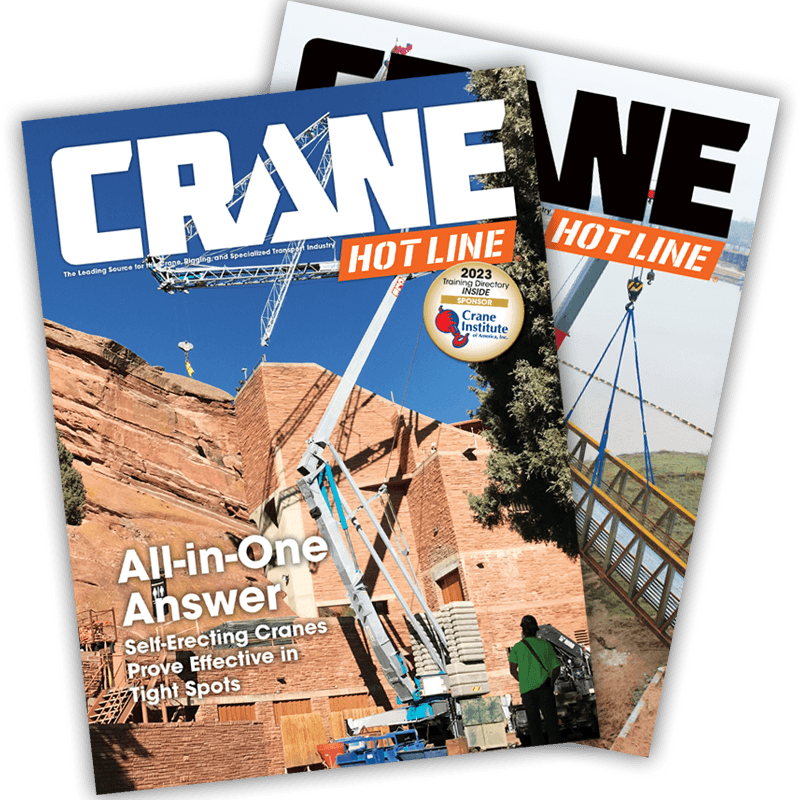Zoom Boom Ready to Handle Military Jobs
July 21, 2005

Enlarge Image
Image 1. The CareLift ZB32032 is a “superweight” telehandler.
CareLift was compelled to take this very big step when it was approached by the United States Navy, which needed a machine specifically for handling watercraft. Although the details are classified, it is known that the initial request was for handling small, submergible watercraft large enough for only two or three people. Since that initial query, the Navy has also shown interest in using the ZB32032 for handling 20,000-pound, 9-foot-wide, jet-powered patrol boats similar to the Zodiac™.
The first in a two-part series, this article reviews the machines features and specifications. Watch next issue for a discussion of its operation and service features.

A look at the numbers
Standing next to the ZB32032, I felt dwarfed by its size, which is understandable considering its capacity and maximum lift height of 32 feet. The machine can lift 15,000 pounds at its full lift height as well as at a reach of about 15 feet.
Enlarge Image

Image 2. ZB32032 capacity chart.
Notice that the telehandler is not equipped with outriggers or stabilizers. Although not an initial requirement of the Navy, the fact that this unit is able to pick and carry a 20,000-pound load at an approximate 50-inch load center proved to be essential in handling the jet patrol boats. With the standard carriage and the load at a 24-inch center, the unit can pick and carry the full 32,000 pounds (see Image 2).
The unit I reviewed was fitted with an optional side shifting carriage and a hydraulic fork positioning feature, which allows each fork to be independently positioned. This feature was dictated by the Navy application. When so equipped, the unit's maximum capacity is reduced to 30,000 pounds.
I reviewed the ZB32032 following its exhibition at ConExpo and prior to it being sent for an audition at the San Diego Naval Shipyard. This prototype/pre-production machine will undergo a few structural changes in subsequent production models. Tipping the scales at 67,000 pounds, the biggest adjustment will be a reduction in the unit's GVW. An attainable target weight has been set between 60,000 and 62,000 pounds.

The power behind the ZB32032
Power for this big guy comes from a turbocharged Cummins QSB 5.9 liter engine that produces peak horsepower of 173 hp. Engine performance is managed by an electronic microprocessor that reads and displays engine status. The Murphy
Enlarge Image
PV (Power View) 100 LCD readout in the cab displays oil pressure, water temperature and alternator output, to name a few. In addition, information can be set to display in a number of different languages. These features are partly due to Cummins attaining more stringent Tier 2 emission standards.

Image 3. Twin fork carriage cylinders are needed to handle the massive amount weight this machine can lift. Options include side-shift carriage and hydraulic fork positioning.
This power plant is mid-mounted and runs straight down the center of the chassis. Power is channeled to the driveline through a massive powershift transmission supplied by Dana; and an in-line configuration allows the transmission to couple directly to the transfer box. The T32000 transmission offers three forward and reverse speeds. CareLift employs heavy-duty AxelTech (formerly Rockwell) axles that give the unit its 118-inch wide stance. These axles utilize outboard planetary final drives that produce a 22:1 drive ratio.
Drum-style service brakes are located on all four wheel and feature foot-pedal inching ability. The parking brake utilizes a dual pinion disk brake system. (Two brakes are used because CareLift couldn't find a single brake large enough to handle the job by itself.) The dual parking brakes are mounted directly to the output shaft of the center differential, where they can leverage the 22:1 final drive ratio. In addition, the parking brakes are equipped with a transmission disconnect to prevent the operator from driving through the brakes. The unit is equipped with pneumatic 16.0 X 25 Bridgestone tires boasting a thick-skinned 28-ply rating.

 |
|
Enlarge Image |
 |
|
Enlarge Image |
These cylinders are matched in the rear by a pair of master cylinders. Extra cross braces and gussets are evident throughout the machine (see Image 5), which likely contributes to this machine's heavy GVW.
This carriage can be quickly disconnected and the boom head accepts a variety of attachments. Fitted with the correct hydraulic attachment, a machine this size would make a great cable spool, pipe or pole handling unit.

In Part Two, I will review the ZB32032's operation and service features and give you my hands-on impression of this new giant telescopic handler.


